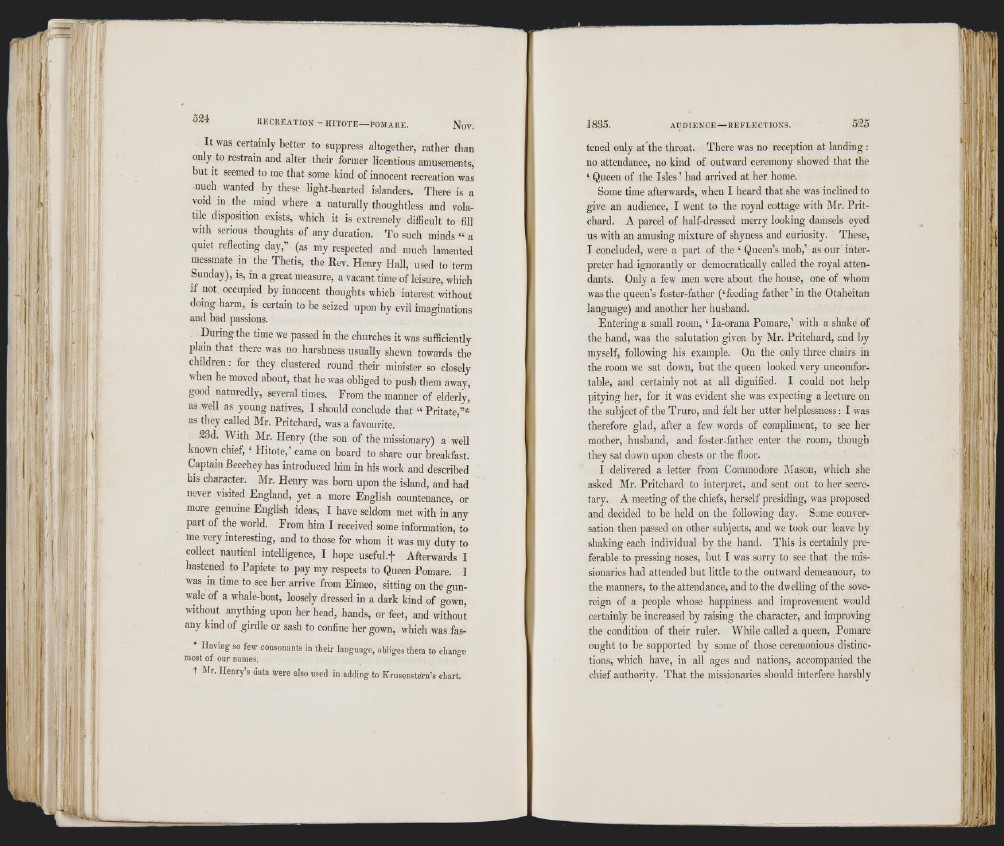
I t was certainly better to suppress altogether, rather than
only to restrain and alter their former licentious amusements,
but it seemed to me that some kind of innocent recreation was
nuch wanted by these light-hearted islanders. There is a
void in the mind where a naturally thoughtless and volatile
disposition exists, which it is extremely difficult to til]
with serious thoughts of any duration. To such minds “ a
quiet reflecting day,” (as my respected and much lamented
messmate in the Thetis, the Rev. Henry Hall, used to term
Sunday), is, in a great measure, a vacant time of leisure, which
if not occupied by innocent thoughts which interest ivithout
doing harm, is certain to be seized upon by evil imaginations
and bad passions.
During the time we passed in the churches it was sufficiently
plain that there was no harshness usually shewn towards the
children : for they clustered round their minister so closely
when he moved about, that he was obliged to push them away,
good naturedly, several times. From the manner of elderly,
as well as young natives, I should conclude that “ Pritate,”*
as they called Mr. Pritchard, was a favourite.
23d. With Mr. Henry (the son of the missionary) a well
known chief, ‘ Hitóte,’ came on board to share our breakfast.
Captain Beechey has introduced him in his work and described
his character. Mr. Henry was born upon the island, and had
never visited England, yet a more English countenance, or
more genuine English ideas, I have seldom met with in any
part of the world. From him I received some information, to
me very interesting, and to those for whom it was my duty to
collect nautical intelligence, I hope useful.# Afterwards I
hastened to Papiete to pay my respects to Queen Pomare. 1
was in time to see her arrive from Eimeo, sitting on the gunwale
of a whale-boat, loosely dressed in a dark kind of gown,
without anything upon her head, hands, or feet, and without
any kind of girdle or sash to confine her gown, which was fas-
• Having so few consonants in their language, obliges them to change
most of our names,
t Mr. Henry’s data were also used in adding to Krusenstern’s chart.
tened only at the throat. There was no reception at landing ;
no attendance, no kind of outward ceremony showed that the
‘ Queen of the Isles ’ had arrived at her home.
Some time afterwards, when I heard that she was inclined to
give an audience, I went to the royal cottage with Mr. Pritchard.
A parcel of half-dressed merry looking damsels eyed
us with an amusing mixture of shyness and curiosity. These,
I concluded, were a part of the ‘ Queen’s mob,’ as our interpreter
had ignorantly or democratically called the royal attendants.
Only a few men were about the house, one of whom
was the queen’s foster-father (‘feeding father’ in the Otaheitan
language) and another her husband.
Entering a small room, ‘ la-orana Pomare,’ with a shake of
the hand, was the salutation given by Mr. Pritchard, and hy
myself, following his example. On the only three chairs in
the room we sat down, but the queen looked very uncomfortable,
and certainly not at all dignified. I could not help
pitying her, for it was evident she was expecting a lecture on
the subject of the Truro, and felt her utter helplessness: I was
therefore glad, after a few words of compliment, to see her
mother, husband, and foster-father enter the room, though
they sat down upon chests or the floor.
I delivered a letter from Cormnodore Mason, which she
asked Mr. Pritchard to interpret, and sent out to her secretary.
A meeting of the chiefs, herself presiding, was proposed
and decided to be held on the following day. Some conversation
tlien passed on other subjects, and we took our leave by
shaking each individual by the hand. This is certainly preferable
to pressing noses, but I was sorry to see that the missionaries
bad attended but little to the outward demeanour, to
the manners, to the attendance, and to the dwelling of the sovereign
of a people whose happiness and improvement would
certainly be increased by raising the character, and improving
the condition of their ruler. While called a queen, Pomare
ought to be supported by some of those ceremonious distinctions,
which have, in all ages and nations, accompanied the
chief authority. That the missionaries should interfere harshly
l l
J '